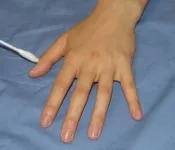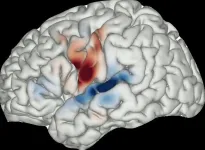(Press-News.org) Patients with frontotemporal dementia often lack the ability to empathize. A study at Karolinska Institutet has now shown that these patients do not show the same brain activity as healthy individuals when they witness the pain of others, a finding that it is hoped will increase understanding of this specific dementia disease.
Around 25 000 Swedes are affected by dementia every year. Of these, about three percent are diagnosed with frontotemporal dementia. The disease is difficult to diagnose, but one of its characteristics is that sufferers lose the ability to empathize, which can lead to problems for them, and not least for their relatives.
In the current study, led by researchers Olof Lindberg at Karolinska Institutet and Alexander Santillo at Lund University, 28 patients diagnosed with frontal lobe dementia were analyzed using functional magnetic resonance imaging (fMRI).
The researchers were able to see how the subjects' brain activity was affected when they were shown images of hands being penetrated by needles, which normally activates the parts of the brain that tend to react to the experience of suffering or pain in others.
The study shows that people with frontotemporal dementia do not display any activation of the frontal brain networks that are activated in the control group of age-matched healthy individuals.
“What is particularly interesting is that we have been able to relate this measure of brain activity in patients to how carers rate their lack of empathy. There turned out to be a strong correlation, and that's important. It shows that what happens in the brain is connected to the people's behavior,” says Olof Lindberg.
Dementia usually means memory problems, but frontotemporal dementia with a loss of ability to empathize with other people can resemble other conditions with empathy problems in psychiatry, such as psychopathy. Olof Lindberg believes that the new findings on how brain activity is affected will increase understanding of the disease.
“This captures a key symptom in patients, and with a lack of empathy, it naturally becomes more difficult to act socially. So, it can affect the judgement of whether to be cared for at home, for example.”
The study was carried out in collaboration between Skåne University Hospital, Norrland University Hospital and Karolinska University Hospital Huddinge.
Publication: ‘Altered empathy processing in frontotemporal dementia’, Olof Lindberg, Tie-Qiang Li, Cecilia Lind, Susanna Vestberg, Ove Almkvist, Mikael Stiernstedt, Anita Ericson, Nenad Bogdanovic, Oskar Hansson, Luke Harper, Eric Westman, Caroline Graff, Theofanis Tsevis, Peter Mannfolk, Håkan Fischer, Gustav Nilsonne, Predrag Petrovic, Lars Nyberg, Lars-Olof Wahlund, Alexander F Santillo, JAMA Open Network, online December 3, 2024.
END
New study shows how dementia affects the brain's ability to empathise
2024-12-03
ELSE PRESS RELEASES FROM THIS DATE:
An inflatable gastric balloon could help people lose weight
2024-12-03
CAMBRIDGE, MA -- Gastric balloons — silicone balloons filled with air or saline and placed in the stomach — can help people lose weight by making them feel too full to overeat. However, this effect eventually can wear off as the stomach becomes used to the sensation of fullness.
To overcome that limitation, MIT engineers have designed a new type of gastric balloon that can be inflated and deflated as needed. In an animal study, they showed that inflating the balloon before a meal caused the animals to reduce their food intake by 60 percent.
This type of intervention ...
PCORI commits $156 million to new patient-centered health research studies
2024-12-03
WASHINGTON, D.C. — The Patient-Centered Outcomes Research Institute (PCORI) has approved funding awards totaling more than $156 million for new patient-centered comparative clinical effectiveness research (CER), as well as research to improve methods and strengthen the science of engagement in CER. The awards will support 13 CER studies, including three focused on sleep interventions.
“Poor sleep affects more than 50 million people in the United States and is linked to multiple chronic conditions and negative health outcomes,” said PCORI Executive Director Nakela L. Cook, M.D., MPH. “These ...
Debra Bangasser honored with prestigious research award
2024-12-03
ATLANTA — Debra Bangasser, a professor of neuroscience and director of the Center for Behavioral Neuroscience (CBN) at Georgia State University, has been awarded the Daniel H. Efron Research Award by the American College of Neuropsychopharmacology (ACNP).
The award recognizes outstanding basic research contributions to the field of neuropsychopharmacology, which integrates neuroscience and pharmacology to advance understanding of the causes of psychiatric disorders and develop new therapies. Bangasser’s research identifies how stress throughout the lifespan affects the brain to promote ...
The Paul G. Allen Family Foundation awards $9 million to new Allen Distinguished Investigators
2024-12-03
SEATTLE, WASH.—December 3, 2024—The funding, provided through the Allen Distinguished Investigators, a program of The Paul G. Allen Frontiers Group at the Allen Institute, will fuel innovative research in Organelle Communication and Membrane Biophysics. Together these awards represent a total of $9 million dollars in funding from the Paul G. Allen Family Foundation, which will be distributed between 14 researchers investigating the biological principles governing fundamental cellular functions and how they interact. These ...
Brain mapping advances understanding of human speech and hallucinations in schizophrenia
2024-12-03
Voice experiments in people with epilepsy have helped trace the circuit of electrical signals in the brain that allow its hearing center to sort out background sounds from their own voices.
Such auditory corollary discharge signals start and end in two subregions of the brain’s top folded surface, or cortex, a new study shows. One large part of the cortex, the motor cortex, is known to control the body’s voluntary muscle movements, including those involved in speech, while another large section, the auditory cortex, is known to control hearing.
In terms of evolution, the ability of animals and humans to tell ...
Researchers at Case Western Reserve, Mass Eye and Ear aim to prevent hearing loss by protecting inner-ear cells
2024-12-03
CLEVELAND—With a new five-year, $3.2 million grant from the National Institute on Deafness and Other Communications Disorders, researchers at Case Western Reserve University and Mass Eye and Ear will study what causes acquired hearing loss (AHL) and seek new ways to protect against it.
AHL is among the most common health conditions affecting older adults, according to the Centers for Disease Control and Prevention. Although hearing aids can help, AHL has no known cure and, in many cases, scientists are still unsure of its exact cause.
AHL significantly ...
FAU receives $6 million grant to propel expansion of the FAU Marcus Institute of Integrative Health
2024-12-03
Florida Atlantic University’s Marcus Institute of Integrative Health has been awarded a monumental $6 million grant from the late Bernie Marcus and The Marcus Foundation to broaden its services, enhance educational programs, and expand community wellness initiatives, ultimately aiming to create a national model that demonstrates the effectiveness of comprehensive integrative health as the optimal approach for achieving overall well-being for everyone.
This latest grant to FAU from The Marcus Foundation, which was made prior to the passing of Marcus in early November, brings its total contributions for advancing integrative health to more than $10 million, ...
Imaging synaptic vesicles in 3D
2024-12-03
Researchers led by Uljana Kravčenko and her colleagues in the lab of Professor Misha Kudryashev, Group Leader of the In Situ Structural Biology lab at the Max Delbrück Center, have revealed new features of the molecular architecture of synaptic vesicles. Using cryo-electron tomography, the team was able to visualize SVs in 3D and confirm a potentially important protein-protein interaction. They also broadened our understanding of SV function and of how the vesicles are recycled. The study was published in the Proceedings ...
New hydrogel could preserve waterlogged wood from shipwrecks
2024-12-03
From the RMS Titanic to the SS Endurance, shipwrecks offer valuable — yet swiftly deteriorating — windows into the past. Conservators slowly dry marine wooden artifacts to preserve them but doing so can inflict damage. To better care for delicate marine artifacts, researchers in ACS Sustainable Chemistry & Engineering developed a new hydrogel that quickly neutralizes harmful acids and stabilized waterlogged wood from an 800-year-old shipwreck.
Wooden artifacts from shipwrecks are drenched with seawater, an environment that enables acid-producing ...
Studies of misinformation risk inculcating false beliefs without proper debriefs
2024-12-03
To study the effects of misinformation on attitudes, some social science experiments expose participants to false, misleading, or dangerous information. Most Institutional Review Boards require that such studies be followed by a debriefing session, in which participants are told that the information that was presented was not true. Katherine Clayton and colleagues sought to determine whether these debriefs can “undo” the effects of exposure to misinformation. The authors first replicated existing misinformation ...









